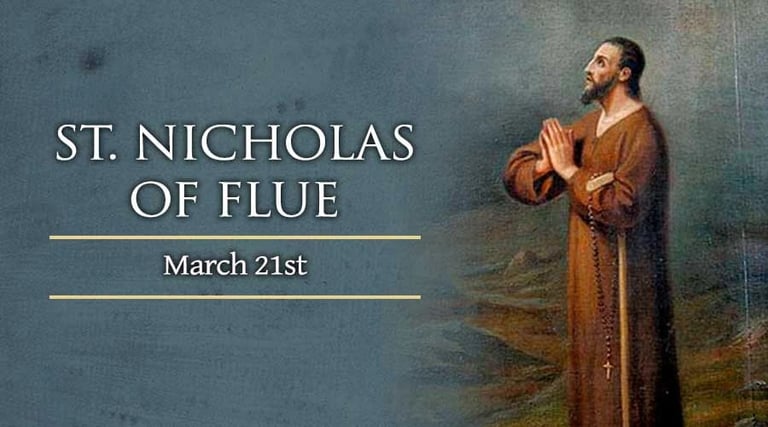Saint of the day March 21, 2025
St. Nicholas of Flue
Nirmala Josephine
3/21/20252 min read


Today, the universal church celebrates the feast of St. Nicholas of Flue. During his lifetime, the Swiss saint had 10 children, became a hermit, and later prevented a civil war.
Nicholas was born in 1417 near the Lake of Lucerne in Switzerland. In addition to his duties as a husband and a father, Nicholas donated his talents and time selflessly to the community and always strove to give an excellent moral example to all.
The saint was also able to devote much of his private life to developing a strong relationship with the Lord. He had a strict regime of fasting and he spent a great deal of time in contemplative prayer.
Around the year 1467, when he was 50 years old, Nicholas felt called to retire from the world and become a hermit. His wife and children gave their approval, and he left home to live in a hermitage a few miles away. While living as a hermit, Nicholas soon gained a wide reputation on account of his personal sanctity, and many people sought him out to ask for his prayers and spiritual advice.
Nicholas lived the quiet life of a hermit for 13 years. However, in 1481, a dispute arose between the delegates of the Swiss confederates at Stans and a civil war seemed imminent. The people called on Nicholas to settle the dispute, so he drafted several proposals which everyone eventually agreed on.
Nicholas' work prevented civil war and solidified the country of Switzerland. But, as a true hermit, he then returned to his hermitage after settling the dispute.
He died six years later on March 21, 1487 surrounded by his wife and children. He was beatified in 1669, and a Church was built in his honor in Sachseln, where his body was interred. Pope Pius XII canonized him in 1947. As
Reflection
Nicholas, as a layman with family responsibilities who took his civic duties as an ancestral landowner seriously, When Nicholas chose a life of seclusion, he never imagined that his hermitage would draw throngs of pilgrims during his lifetime and long after his death. The people of the valley tried to protect him from these intruders. This man is important not for what he said but for what he was: he followed his calling, and his humanity, to the limit.
According to legend, he survived for nineteen years with no food except for the Eucharist. His reputation for wisdom and piety was such that figures from across Europe came to seek advice from him, and he was known to all as “Brother Klaus.”
Despite being illiterate and having limited experience with the world, his is honored among both Protestants and Catholics with the permanent national unity of Switzerland.
